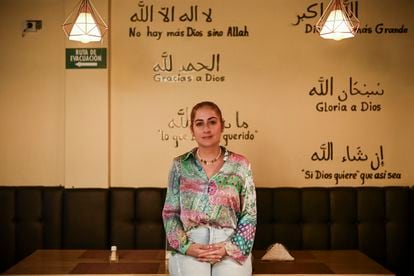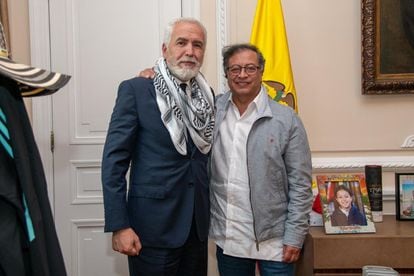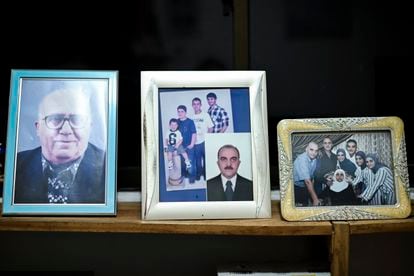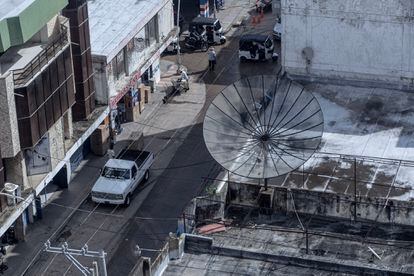Nearly 11,000 kilometers separate the Colombian city of Maicao from the Gaza Strip. However, from there many Colombian-Arabs follow the current conflict as their own affront capable of reopening old wounds.
In 1982, Maruen Ibrahim Fakih's family decided to leave Lebanon behind and return to Colombia, where the little boy had been born four years earlier. Mired in a long-running civil war, Israeli troops invaded Lebanon that year after its ambassador in the United Kingdom suffered a terrorist attack, and after continued hostilities with the Palestine Liberation Organization (PLO), based in Beirut.
Like Ibrahim, numerous Colombians of Arab origin say they have suffered “firsthand” from past outbreaks of Israeli violence and today they closely follow the massacre in Gaza, where more than 22,600 Palestinians have been murdered since last October 7, more than a third of them children, and 57,910 people have been injured, according to data from the Gaza Ministry of Health, controlled by Hamas.
“Those newborn children, one month old, two months old… were those children on the front lines of the battle? Who is being bombed there?” asks Ibrahim, who has worked for more than three decades as a merchant of glass and toy store in Maicao, and that describes the current military offensive as “genocide.”
Organizations such as Human Rights Watch have reported the death of 1 in every 200 children in the Strip – or one child every 10 minutes –, a ratio that the UN Secretary General, António Guterres, described on November 20 as a “slaughter without precedents.”
Newsletter
The analysis of current events and the best stories from Colombia, every week in your mailbox
RECEIVE THE
Ibrahim clearly remembers the failure of the Oslo Accords and the assassination of Israeli Prime Minister Isaac Rabin in 1995. On his desk, the Al Jazeera news channel broadcasts live images from the Strip, besieged by Israel after the Islamists of Hamas carried out a surprise attack in which, according to official sources, 1,200 people were killed and 140 kidnapped.
For Susana Tehfe Fadlallath, a Colombian-Arab psychologist who is the daughter of Lebanese parents and Palestinian roots, the current conflict also makes her relive violent moments that her family suffered decades ago, in southern Lebanon, occupied by Israel until 2000.
“We had to go through a section where the Israeli Army was and I will never forget—being a girl—how for no reason the soldiers pulled the driver out of the car and slapped him twice,” says Tehfe.
The war in Gaza evokes similar experiences for Jiyan Abdala Yohaid, born in Santa Marta, Colombia, and daughter of Lebanese parents. “My only memory of the time I lived in Lebanon as a child is the war,” says this 37-year-old social worker. Also in the 1980s, she remembers playing with three other girls on the street and seeing “an Israeli Army jeep” and two armed soldiers pointing at them. “It was a joke. When they saw us running they started laughing, but I will never forget something like that,” she says today from Maicao.

Walking through the hot and dusty streets of this Colombian city, located in the northernmost region of South America, the desert department of La Guajira – bordering Venezuela – is equivalent to being transported suddenly to the Middle East: on the main street some merchants converse in Arabic, the mosque of Omar Ibn Al-Khattab calls for prayer without much success, and dozens of children study at the Dar El Arkam Colombian-Arabic school.
From the ruins of the Ottoman Empire, in the late 1880s, flows of Arab population migrated to northern Colombia. With the outbreak of the civil war in Lebanon (1975-1990), cities like Maicao received a second exodus and the Arab diaspora reached 15,000 people in this city, according to official figures. Many were attracted by echoes of Venezuela's black gold abundance and a flourishing smuggling economy.
Today there is hardly any of that left boom economic. Many abandoned Maicao, whose community descended from Palestinians, Syrians and Lebanese was reduced to no more than 3,000 individuals, according to figures from the Mayor's Office. For them, this little corner of Latin America continues to be linked to a global Arab community that today seeks to unite voices in the face of what they consider a complicit silence from much of the West.
Latin America for Human Rights
Leaders and representatives of at least eleven countries in Central and South America have expressed themselves explicitly against the violence unleashed by Israel in Gaza and the West Bank.
The presidents of Brazil, Mexico and Peru have publicly demanded a ceasefire, while Bolivia has completely severed relations with Israel. At the same time, Chile, Honduras and Colombia have called their ambassadors for consultations, going so far as to describe the current conflict as “genocide.”
“The barbarity of the state of Israel against the Palestinian people has far surpassed the barbarity of Hamas against the civilian population of Israel,” said the president of Colombia, Gustavo Petro, on November 18.

Latin American support for the Palestinian cause has not emerged only from its political class, ordinary people have demonstrated throughout the continent against the human rights violations committed in Gaza and, above all, in rejection. of the murder of civilians and children.
The participants in these protests have also denounced Israel, due to its occupation of East Jerusalem and the West Bank, as an invading force similar to those that plundered the American continent over hundreds of years.
For decades, Latin America has been the recipient of a large flow of migrants of Arab descent, which according to the UN Educational, Scientific and Cultural Organization (UNESCO), totals between 17 and 20 million people.
In Colombia, the Colombo Arab Cultural Center estimates that in 2006 there were 1.5 million people of Arab descent, which for some experts would explain the massive anti-war support and against the occupation of the Palestinian territories in the country, with demonstrations in cities such as Bogotá, Cartagena, Barranquilla and Bucaramanga.

In Maicao, on October 20, nearly 200 people demonstrated in front of the Omar Ibn Al-Khattab mosque, the first built in the country (in 1997). From there they went to one of the city's main parks, singing in unison “Palestine resists, Gaza exists.”
Several women's organizations led the organization of the event thanks to the initiative of Tehfe, who says that the main objective was “the defense of life” against the continuous murder of women and children. “We know that there is very little that can be done from here, but we believe that it is a way of resisting something that hurts us,” says the activist and psychologist.
Muhammad Dasuki became the first Muslim to be elected mayor in Colombia in 2019. He agrees with Tehfe. “I raise my voice of rejection against everything that is happening and invite the international community to act immediately. We cannot allow one more child to die,” he asserts.
For his part, Ibrahim, the mosque's imam, believes that the only possible solution is a definitive peace between Palestinians and Israelis. “All the Arab people are shocked and sad. “He is in mourning for everything that is happening,” says this spiritual leader, born in Egypt and stationed in Maicao for three years.
“I'd rather have her here than cry for her later.”
Israeli Prime Minister Benjamin Netanyahu declared at the end of December that the offensive “will last many more months” until Israel controls all entrances and exits to the enclave, including the Rafah crossing bordering Egypt.
Many fear that the violence will worsen and that attacks will increase on the southern border between Israel and Lebanon. There, militants from the terrorist group Hezbollah and Israeli soldiers maintain intense cross attacks, in which 19 civilians have already died, according to Lebanese security sources, and 138 members of the Shiite militia supported by Iran, according to statements from the group itself.
On January 2, an explosion caused by a drone in a neighborhood on the outskirts of Beirut killed Saleh al Aruri, Hamas' number two, along with two other commanders of its armed wing, the Qassam Brigades, and others. group members. Palestinian and Lebanese security sources accused Israel, in what could trigger a regional escalation if the pro-Iran militia Hezbollah responded to the attack.
Thousands of kilometers away, in Maicao, Tehfe only thinks about bringing his parents and grandmother to Colombia before an escalation occurs. The elderly woman has serious health problems and she has not been able to return to Colombia because, although she is a citizen of this country, her passport has expired.

For this reason, on November 7, Tehfe sent a letter addressed to President Petro and the Minister of Foreign Affairs, Álvaro Leyva, requesting help for the repatriation of his relatives. Although the
Foreign Ministry responded the day after sending this communication, asking for more information to carry out the process, Tehfe's grandmother entered intensive care in Lebanon and the doctors in charge of her do not recommend that she be transferred from it.
For his part, the Colombian of Lebanese parents Ali Reda, 50 years old and a merchant in a baby clothing store, managed to repatriate his daughter at the beginning of November. He confesses that for a long time he wanted to bring his 12-year-old daughter from Lebanon, but that the war accelerated the process. He says he doesn't want to take any risks.
“I prefer to have her here by my side than to have to mourn her later,” says this father, like many others, suffering from a distance for those who have seen their loved ones die in Gaza for 50 days.
Subscribe here to the EL PAÍS newsletter about Colombia and here to the channel on WhatsAppand receive all the information keys on current events in the country.
Subscribe to continue reading
Read without limits
_
#live #war #firsthand #Arab #diaspora #Colombia #calls #definitive #peace #Gaza